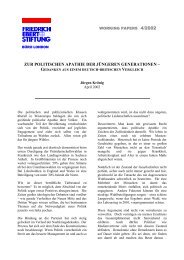Where Now for European Social Democracy? - Policy Network
Where Now for European Social Democracy? - Policy Network
Where Now for European Social Democracy? - Policy Network
You also want an ePaper? Increase the reach of your titles
YUMPU automatically turns print PDFs into web optimized ePapers that Google loves.
94WHERE NOW FOR EUROPEAN SOCIAL DEMOCRACY?A historic new compromise<strong>Social</strong> protection to guarantee employees against major risks, or moreoften, against poverty, does not date from the establishment of theWelfare State 2 . It originates in the idea of assistance, which is designedmore to ensure a healthy work<strong>for</strong>ce than it is to protect individuals.Welfare marks a rupture in this movement; assistance ceded placeto insurance. Although <strong>European</strong> Welfare States are rooted in a varietyof conceptions and traditions, 3 the establishment of the providentialstate responded to a general desire to cover the great majority of thepopulation against most risks. In all <strong>European</strong> countries, the secondhalf of the twentieth century saw a strong growth in social spending;the 1980s were characterised in this respect by the ef<strong>for</strong>ts of lessrich countries to catch up. In 2000, social spending as a percentage ofGDP varied from 32.2 per cent of GDP in Sweden, to 20 per cent inSpain and Portugal.The appearance of modern social protection in the middle of thelast century was not only a response to the precariousness of theemployee, even if this was an essential dimension. It was also a resultof the memories of the recent past: the economic crisis of the 1930s,the toppling of democracies and war. In most <strong>European</strong> countries,political and social reconstruction was inseparable from a strong stateengagement in the protection of employees and their families.These systems are today being called into question. Contrary towhat liberals claim, this is not explained principally by budgetaryconstraints, even if this has strongly contributed to this. Thechallenges which our societies are facing affect the entire social andpolitical spheres. Profound trans<strong>for</strong>mations in social systems arenecessary: the fragility of populations is growing, and societies areengulfed in a ‘crisis of destiny’. We are worried about the future,conscious of the social trans<strong>for</strong>mations wrought by globalization, andyet, at the same time, the cult of the individual encourages our hopesof personal advancement. The result is an enfeeblement of socialprotection. It is necessary to reconstruct the social pact, as in the1940s and 1950s, which will guarantee national cohesion anddemocracy. The articulation of policies of security are indispensable.



